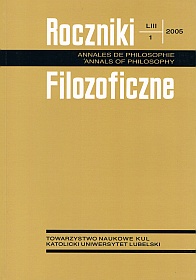Zagadnienia filozoficzne w pracach Lewisa Carrolla
Abstrakt
The article tries to answer the following questions: Why did Lewis Carroll’s ideas, expressed in the form of fairy tales, fascinate numerous analytical philosophers? What does Carroll’s contribution to the contemporary logic and philosophy consist in?
The basic thesis of the article is that Lewis Carroll – remaining in the Anglo-Saxon tradition of David Hume’s and George Berkeley’s philosophy – supplied material illustrating the problems connected with the use of language. He showed how improper use of language leads to formation of philosophical problems.
The article presents Carroll’s output. He was one of the pioneers of symbolic logic that he developed in Boole’s and De Morgan’s tradition – in the field of the so-called recreation mathematics that he popularized in the form of riddles, puzzles, doublets and puns, compared by some logicians to a formal system.
The article presents the essence of the theory of language developed by Carroll, in which language may be something hermetic with only one person having access to it (the case of Humpty Dumpty), but also something common, something social (Alice’s conversation with the White King). Attention is paid to the fact that Carroll differentiated between what is nonsensical and what is absurd (the criterion being its relation to logic). It is pointed that Carroll’s aim was first of all discovering the nonsense that is hidden behind the formulation of a metaphysical problem.
In the article also the connections are studied between Carroll and Ludwig Wittgenstein, the relation between them being seen in the view that absurd introduced by means of humor is a kind of vaccine that is supposed to protect us from forming absurdity in philosophy.
In conclusion it is stated that Carroll’s ideas that are the most significant for analytic philosophers are concerned with the nature of language that is not a transparent medium for him, but something that offers resistance when we communicate with others, as well as something that may be flexible and adjusted to our will. By manipulating language Carroll shows in what way philosophy balances between sense and nonsense and how often philosophical questions arise from erroneous use of language and erroneous posing of problems.
Bibliografia
Alexander P.: Logic and the Humour of Lewis Carroll, „Proceedings of the Leeds Philosophical and Literary Society” 6 (1951), s. 551-566.
Auden W.H.: Today’s “Wonder-World” Needs Alice, [w:] R. Phillips (ed.), Aspects of Alice: Lewis Carroll’s Dreamchild as seen through the Critics’ Looking-Glasses 1865-1971, London: Victor Gollancz 1972, s. 3-12.
Berman D.: Berkeley. Eksperymentalna filozofia, Miniatury filozoficzne, przeł. R. Flaszak, Warszawa: Amber 1997.
Blackburn S.: Myśl. Zaproszenie do filozofii, przeł. J. Karłowski, Poznań: Dom Wydawniczy REBIS 2002.
Braithwaite R.B.: Lewis Carroll as Logician, [w:] D. Gray, Lewis Carroll: Alice in Wonderland, New York: W.W. Norton 1971, s. 298-302
Crick F., Koch Ch.: Problem świadomości, „Świat Nauki” 2003, nr 1.
Gardner M.: Wszechświat w chusteczce. Rozrywki matematyczne, a także zabawy, łamigłówki i gry słowne Lewisa Carrolla, przeł. W. Bartol, Warszawa: Prószyński i S-ka 1999.
Heath P.: The Philosopher’s Alice, London: Academy Editions 1974.
Holmes R.W., Filozof o Alicji w Krainie Czarów, przeł. M. Iwanicki, M. Osmański, „Znak” 2003, nr 577, s. 95-111.
James W.: Pragmatyzm. Nowe imię paru starych stylów myślenia, przeł. M. Szczubiałka, Warszawa: Wydawnictwo KR 1998.
Kitcher P., A priori knowledge, „Philosophical Review”, 89 (1980), s. 3-23.
Levin H.: Wonderland Revisited, [w:] R. Phillips (ed.), Aspects of Alice: Lewis Carroll’s Dreamchild as seen through the Critics’ Looking-Glasses (1865-1972), London: Victor Gollancz 1972, s. 175-197.
Mellor D.H., Filozofia analityczna i jaźń, przeł. R. Majeran, [w:] P. Gutowski, T. Szubka (red.), Filozofia brytyjska u schyłku XX wieku, Lublin: TN KUL 1998.
Pitcher G.: Wittgenstein, Nonsense and Lewis Carroll, [w:] K.T. Fann, L. Wittgenstein, The Man and His Philosophy, New York: Dell 1967, s. 315-335.
Ridley M.: Czerwona Królowa. Płeć a ewolucja natury ludzkiej, przeł. J.J. Bojarski, A. Milos, Poznań: Dom Wydawniczy REBIS 1999.
Russell B.: Lewis Carroll: Alice in Wonderland, discussion with K.A. Porter and M. Van Doren, New York: Random House 1942.
Russell B.: The Principles of Mathematics, London: George Allen & Unwin 1956.
Saint-Exupéry A.: Mały Książę, przeł. J. Szwykowski, Warszawa: PAX 1994.
Spacks P.M.: Logic and Language in Through the Looking-Glass, [w:] R. Phillips (ed.), Aspects of Alice: Lewis Carroll’s Dreamchild as seen Through the Critics’ Looking-Glasses (1865-1972), London: Victor Gollancz 1972, s. 267-275.
Sutherland R.D.: Language and Lewis Carroll, The Hague: Mouton 1970.
Wittgenstein L.: Dociekania filozoficzne, przeł. B. Wolniewicz, Warszawa: PWN 2000.
Copyright (c) 2005 Roczniki Filozoficzne

Utwór dostępny jest na licencji Creative Commons Uznanie autorstwa – Użycie niekomercyjne – Bez utworów zależnych 4.0 Międzynarodowe.





